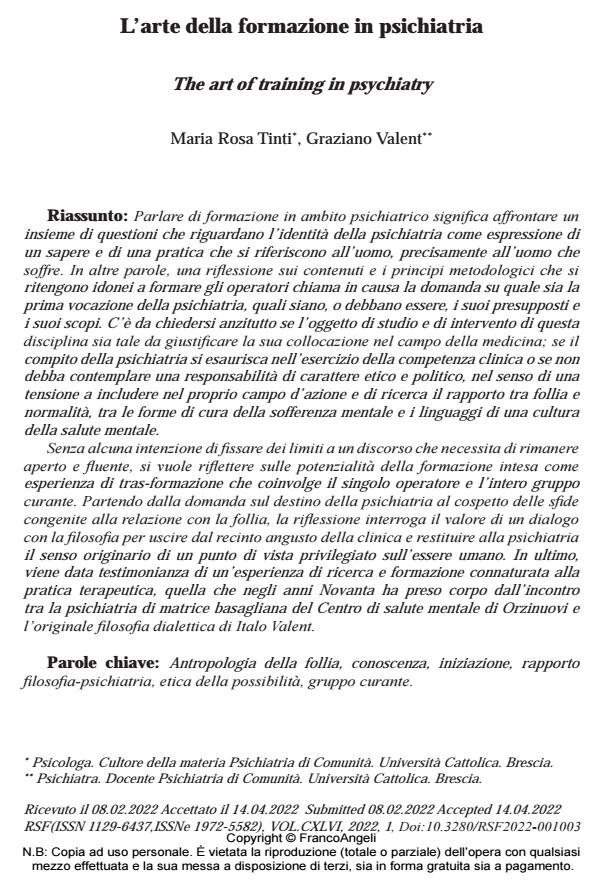The art of training in psychiatry
Journal title RIVISTA SPERIMENTALE DI FRENIATRIA
Author/s Maria Rosa Tinti, Graziano Valent
Publishing Year 2022 Issue 2022/1
Language Italian Pages 29 P. 47-75 File size 252 KB
DOI 10.3280/RSF2022-001003
DOI is like a bar code for intellectual property: to have more infomation
click here
Below, you can see the article first page
If you want to buy this article in PDF format, you can do it, following the instructions to buy download credits

FrancoAngeli is member of Publishers International Linking Association, Inc (PILA), a not-for-profit association which run the CrossRef service enabling links to and from online scholarly content.
To speak of training in the field of psychiatry is to address a set of questions concerning the identity of psychiatry as an expression of knowledge and practice that relate to humankind, especially the suffering human. In other words, a reflection on the contents and methodological principles that are considered suitable for training professionals raises the question of what the primary vocation of psychiatry is, what its assumptions and aims are, or should be. First of all, we need to ask ourselves whether the object of study and intervention of this discipline is such as to justify its place in the field of medicine; whether the task of psychiatry is limited to the exercise of clinical competence or whether it should include responsibility of an ethical and political nature, in the sense of a tendency to comprise in its field of action and research the relationship between insanity and normality, between the forms of treatment of mental suffering and the languages of a culture of mental health. Without any intention to set limits to a discourse that needs to remain open and flowing, the aim is to reflect on the potential of training as an experience of transformation that involves the individual practitioner and the entire care team. Starting from the question of psychiatry’s fate in the face of the challenges inherent in the relationship with insanity, the reflection examines the value of a dialogue with philosophy in order to leave the narrow confines of the clinic and restore to psychiatry the original sense of a privileged point of view on the human being. Lastly, there is the testimony of an experience of research and training intrinsic to therapeutic practice, that which took shape in the 1990s from the encounter between the Basagliainspired psychiatry of the Orzinuovi Mental Health Centre and the original dialectical philosophy of Italo Valent.
Keywords: Anthropology of insanity, knowledge, initiation, philosophypsychiatry relationship, ethics of possibility, care team.
Maria Rosa Tinti, Graziano Valent, L’arte della formazione in psichiatria in "RIVISTA SPERIMENTALE DI FRENIATRIA" 1/2022, pp 47-75, DOI: 10.3280/RSF2022-001003